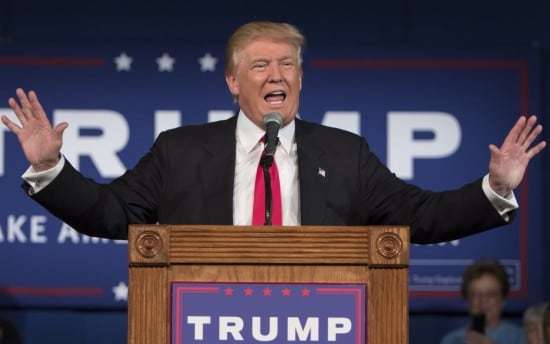The Volokh Conspiracy
Mostly law professors | Sometimes contrarian | Often libertarian | Always independent
Did Trump truly repudiate torture and the murder of civilians?

Donald Trump has repeatedly advocated the murder of terrorists' families, and the use of torture on prisoners taken in the War on Terror. He reiterated those positions as recently as Thursday night's GOP presidential debate. But, on Friday, many media outlets reported that Trump has suddenly reversed his position on these issues.
Unfortunately, that isn't true. Any sighs of relief over Trump's supposed reversal are premature. What Trump actually said in a statement issued to the Wall Street Journal on Friday is that he "understand[s] that the United States is bound by laws and treaties and I will not order our military or other officials to violate those laws." That is not the same thing as saying he will refrain from ordering the military to target civilians or torture prisoners. As Democrat Rep. Adam Schiff points out, Trump "has now said he would obey the law, he has yet to specifically disavow torture or killing the families of our enemies."
Why does the difference matter? Because a President Trump could easily try to use expansive theories of executive power to claim that seemingly illegal orders are actually perfectly legal. To find such arguments, he need look no further than John Yoo's notorious "torture memo" from the Bush administration, which argued that the President's powers as commander-in-chief allow him to override international treaties and congressional statutes. While the torture memo was eventually repudiated even by the Bush administration, and most legal scholars disagree with its reasoning, Trump or some other future president could try to revive similar arguments.
It is worth noting that the Obama administration has also played fast and loose with legal reasoning in order to justify dubious expansions of executive power. Most notably, President Obama overrode the advice of his own Office of Legal Counsel and embraced the ridiculous view that the war against Libya did not require congressional authorization because it wasn't a real war, and didn't even qualify as "armed hostilities" under the War Powers Act. Unlike Trump, Bush and Obama did not go so far as to advocate the deliberate murder of civilians. But Trump could adapt their reasoning to justify taking this additional heinous step.
Like Trump on Friday, both the Bush and Obama administrations repeatedly stated that they would obey the law. But both then used brazenly expansive interpretations of executive power to get around it. Given his authoritarian tendencies, it doesn't seem likely that Trump would be any less eager to press the limits of his authority by relying on specious legal arguments. He has a long history of using dubious legal theories to try to silence his critics and get the government to seize the property of others for his benefit. Is there any reason to believe he will suddenly become more fastidious about the law once in the White House? If anything, the temptations of presidential power are likely to have the opposite effect (as was certainly the case with both Bush and Obama).
There is a lesson here for reporters and other commentators. With Trump and other presidential candidates, it is not enough to ask whether they will obey the law. Virtually all of them will happily say yes. The really important question is what they think the law is, and how much it constrains presidential power.
Another key lesson here is that we must establish stronger institutional limits on presidential power. Whether Trump ever becomes president or not, it is far too easy for an unscrupulous (or even a well-intentioned) executive to get away with breaching constitutional constraints on executive authority.
Should Trump actually order the military to target civilians or engage in torture, they will have a legal and moral duty to disobey. During Thursday's debate, Trump dismissed that possibility, saying that "I'm a leader, I've always been a leader. I've never had any problem leading people. If I say do it, they're going to do it."
I hope and expect that most military officers have better character than Trump gives them credit for. But even if they do disobey, the result might not be a happy one. If officers (especially high-ranking ones) disobey the civilian commander-in-chief, that could lead to a dangerous constitutional crisis. Also, what happens if Trump says "you're fired" to the recalcitrant officers and appoints more unscrupulous replacements who might be more willing to follow his illegal directives? However this turns out, it is unlikely to help make America great again.
Ultimately, there is no way to know for sure whether a President Trump would actually order torture and the murder of civilians. It might well depend on whether he thinks it would be politically advantageous, and whether he expects to get away with it. In the aftermath of a major terrorist attack that triggers public anger and strong sentiment for a forceful response, he could conclude that the political advantages outweigh any possible risks. That danger is one of many reasons why we should not take the risk of putting him in the Oval Office in the first place.
UPDATE: Earlier today, Trump said that "[w]e're going to stay within the laws [on torture]. But you know what we're going to do? We're going to have those laws broadened because we're playing with two sets of rules: their rules and our rules," Trump said pointing to ISIS's tactics, which have included torture and brutal executions." This indicates that he is far from abandoning his desire to use torture. "Stay[ing] within the laws" might mean he would not order the use of torture until Congress passes new laws authorizing its use. But it does not necessarily exclude the use of broad claims of executive power. After all, if the executive already has the authority to override congressional statutes, then he can use that power while still staying within the law.


Show Comments (0)